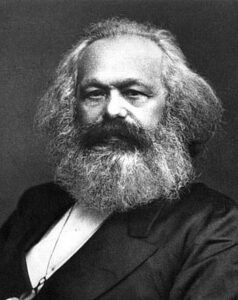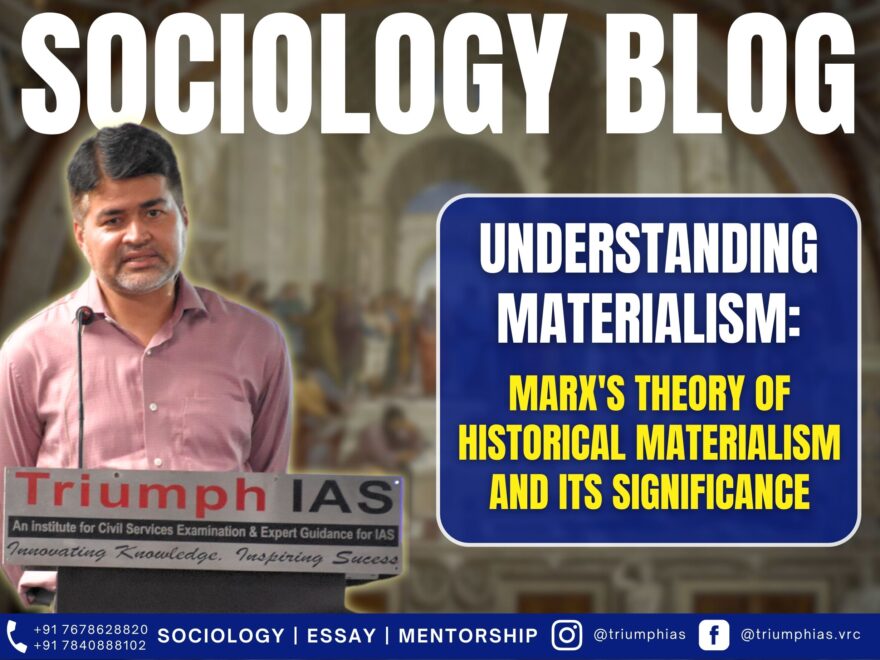
The production of too many useful things results in too many useless people.
What is materialism?
(Relevant for Sociology Optional Paper 1 (Unit 4))
- Materialism seeks to provide scientific explanations for phenomena, including religion, and stands in opposition to idealism. Idealism posits that ultimate reality lies in a realm of transcendent phenomena known as “ideas,” while materialism asserts that everything that exists depends on matter. Historical Materialism, in particular, emphasizes the fundamental and causal role of material production in shaping human history.
- The act of production, beyond mere material greed or wealth accumulation, engages individuals in social relationships. According to Marx, these social relations transcend the realm of individual preferences. The production of basic necessities of life compels individuals to enter into specific social relations that exist independently of their will. This notion forms the foundation of Marx’s theory of society.
- Marx emphasizes that certain social relations impact individuals regardless of their choices. Understanding the historical process depends on recognizing these objective social relations. Throughout much of human history, Marx argues, these relationships manifest as class relations, giving rise to class struggle. He contends that socio-political and intellectual developments are conditioned by the mode of material production, forming the basis for his comprehensive view of history.
- Marx states that the growth of new productive forces clashes with existing relations of production. When people become aware of this conflict, they seek to resolve it. This period of history, according to Marx, is known as the period of social revolution. Revolutions bring about the resolution of conflicts. Therefore, Marx posits that the growth of new productive forces shapes the course of human history. These productive forces represent the capacities society employs to produce the material conditions of life. Thus, Marx views human history as an account of the development and consequences of new forces of material production, giving rise to the concept of historical materialism.
- Marx introduces the concepts of infrastructure and superstructure to analyze societies. Social relations are defined by material conditions, which Marx refers to as the infrastructure. The economic base of a society forms its infrastructure. Any changes in material conditions entail corresponding changes in social relations. Forces and relations of production fall within the domain of infrastructure. The superstructure encompasses legal, educational, and political institutions, as well as values, cultural norms, religion, ideologies, and philosophies.
- According to Marx, forces of production consist of two elements: means of production (tools, machines, factories, etc.) and labor power (the skills, knowledge, experience, and other human faculties utilized in work). Relations of production are formed by the pattern of economic ownership of the means of production. At each stage of historical development, the owners of the means of production constitute the dominant class, while those left with only labor power form the dependent class.
- Marx speaks of the transformation of society from one stage to another, attributing it to internal conflicts and the theory of class struggle. He constructs a historical sequence of society types, ranging from simple undifferentiated societies of “primitive communism” to the complex class societies of “modern capitalism.” Marx explains the great historical transformations that dismantle old societal forms and create new ones in terms of infrastructural changes, which he considers to operate universally and consistently. Each period of contradiction between the forces and relations of production is seen by Marx as a revolutionary period.
- The dialectical relationship between the forces and relations of production provides the basis for a theory of revolution. In Marx’s perspective, revolutions are not accidental political events but rather the social expressions of historical movement. Revolutions occur when the conditions for change reach maturity. Marx asserts that no social order disappears until all the productive forces it can accommodate have been developed, and new higher relations of production do not emerge until the material conditions for their existence have matured within the old society.
- Marx distinguishes between social reality and consciousness, stating that reality is not determined by human consciousness. Instead, he argues that social reality shapes human consciousness. This leads to a comprehensive conception where human
The essence of humanity lies in its ability to engage in labor, to actively transform and shape the world in accordance with human needs, ultimately enriching human existence and potential. In essence, labor is not only an activity but also the very core of human nature. The capacity for labor possesses a progressive quality, as humans have the capability to devise novel and enhanced methods of engaging with the world, thanks to their practical thinking abilities. For instance, the invention of tools amplifies human capabilities, enabling them to accomplish tasks with greater efficacy.
To master these intricacies and fare well in the Sociology Optional Syllabus, aspiring sociologists might benefit from guidance by the Best Sociology Optional Teacher and participation in the Best Sociology Optional Coaching. These avenues provide comprehensive assistance, ensuring a solid understanding of sociology’s diverse methodologies and techniques
materialism, Marx, historical materialism, social relations, class struggle, forces of production, relations of production, infrastructure, superstructure, labor, revolution, human consciousness, human nature
Follow us :
🔎 https://www.instagram.com/triumphias
🔎https://www.youtube.com/c/TriumphIAS
https://t.me/VikashRanjanSociology
Find More Blogs
|
Scope of the subject and comparison with other social sciences |
|||
|
|
|
|
Modernity and social changes in Europe |

